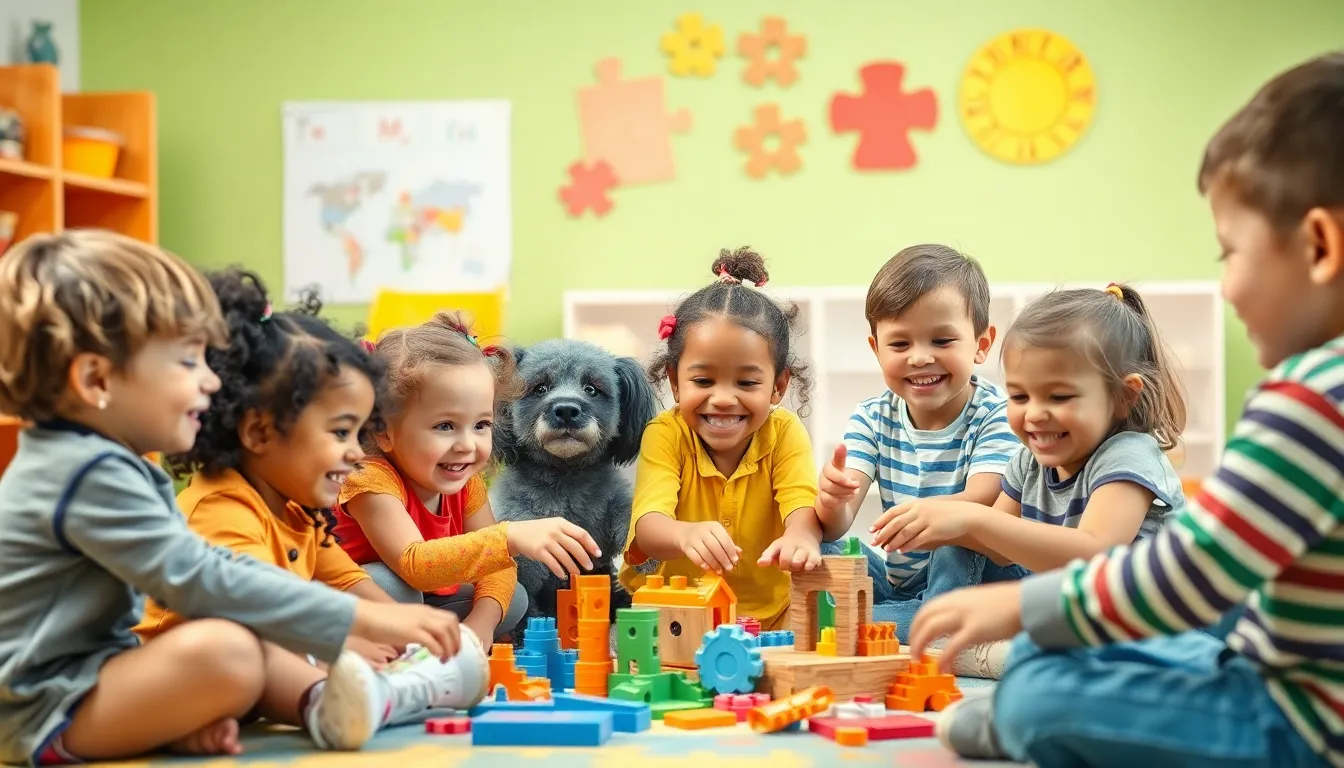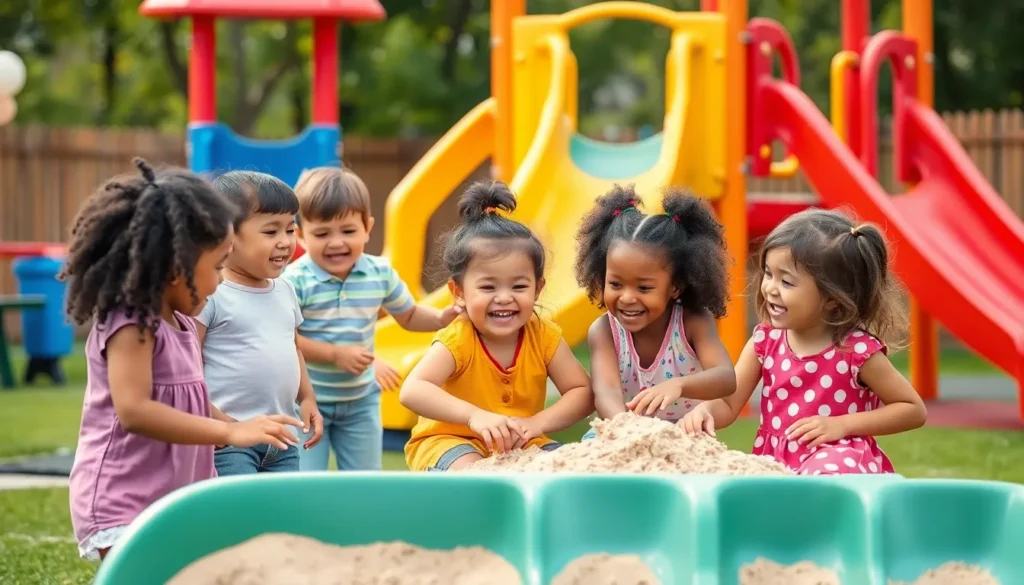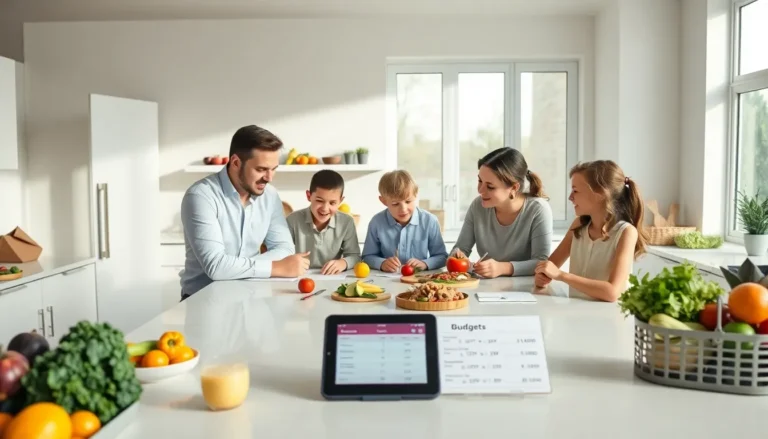Table of Contents
TogglePreschool kids are like tiny tornadoes of energy and curiosity, turning every corner into a potential adventure. With their oversized backpacks and infectious giggles, they’re on a mission to explore the world one crayon at a time. But don’t let their small stature fool you; these little learners are packing a punch when it comes to creativity and imagination.
Overview of Preschool Kids
Preschool kids exhibit a high level of curiosity. They explore their surroundings with a sense of wonder, making connections through play and interaction. Creative expression thrives during this stage, as children engage in activities like drawing, storytelling, and role-playing. Developmentally, they each reach milestones at their own pace, often showcasing unique strengths and preferences.
Learning occurs across various domains for preschoolers. Social skills emerge through group activities, where sharing and cooperation become essential. Cognitive development unfolds through imaginative play, where they practice problem-solving and critical thinking. Language skills flourish as they engage in conversations, expanding their vocabulary and understanding of grammar.
Physical development is another crucial aspect of their growth. Fine motor skills improve through tasks like cutting and coloring, while gross motor skills advance as they run, jump, and climb. Nutrition plays a significant role in supporting their energy levels and overall health. A balanced diet contributes to their physical and cognitive development, helping them stay active and engaged.
Preschool environments provide opportunities for exploration and learning. Play-based curricula foster curiosity, allowing children to pursue their interests while developing foundational skills. Structured routines offer reassurance, helping them navigate their day with confidence.
Participation in preschool helps prepare kids for future educational experiences. Early exposure to formal education enhances social interactions, resilience, and adaptability. Overall, preschool kids thrive in dynamic, supportive environments that nurture their innate curiosity and creativity.
Developmental Milestones

Preschool kids reach various developmental milestones that reflect their growth in multiple domains. These milestones encompass cognitive, social, emotional, and physical aspects of development.
Cognitive Development
Cognitive skills flourish during the preschool years. Children engage in imaginative play that enhances their problem-solving capabilities and critical thinking. They explore concepts of cause and effect as they navigate their play scenarios. Vocabulary expands rapidly through conversations, stories, and songs. Kids often ask questions and seek explanations, demonstrating their thirst for knowledge. Structured activities, such as puzzles and simple games, promote logical thinking. Observing peers enhances their understanding of social cues and actions. Early experiences with numbers and letters lay the foundation for future academic skills. Participation in these activities fosters a sense of curiosity that drives further learning.
Social and Emotional Development
Social and emotional growth is equally important for preschoolers. Children learn to share and cooperate through group activities and play. They develop friendships, which help them understand empathy and different perspectives. Kids often express themselves through art, storytelling, and role-playing, allowing them to communicate feelings. Managing emotions becomes part of their daily interactions. They begin to navigate conflicts with peers, demonstrating negotiation and compromise skills. Engaging in structured routines offers comfort, helping children feel secure. Emotional regulation improves over time through guidance from caregivers and educators. Overall, social experiences shape their ability to connect with others and establish a sense of community.
Educational Approaches
Educational approaches for preschool kids focus on nurturing their curiosity and creativity through effective methods. Two significant strategies stand out: play-based learning and structured learning environments.
Play-Based Learning
Play-based learning fosters engagement and exploration among preschoolers. This approach emphasizes hands-on activities where children use their imagination to solve problems and create narratives. For instance, through role-playing and art projects, kids enhance their cognitive and social skills while enjoying themselves. The freedom to explore various materials and themes sparks creativity and cognitive development. Learning through play encompasses activities that promote collaboration, communication, and emotional expression, allowing children to form deep connections with their peers and surroundings.
Structured Learning Environments
Structured learning environments shape the educational journey of preschool kids. Routines create a sense of safety, enabling children to thrive as they know what to expect throughout the day. Such settings include designated times for various activities, which enhance focus and discipline. Teachers guide students through planned lessons that cater to diverse learning styles and developmental stages. This organized approach encourages even the youngest learners to set goals and develop a sense of accomplishment. Overall, structured environments balance exploration with guidance, fostering a conducive atmosphere for holistic development.
Health and Nutrition
Nutrition significantly impacts preschool kids’ health, fueling their growth and development. Proper nutrition supports their active lifestyles and strengthens their immune systems. A balanced diet includes fruits, vegetables, whole grains, lean proteins, and dairy. These foods provide essential vitamins and minerals vital for cognitive and physical development. Educators and caregivers can encourage healthy eating habits by introducing a variety of flavors and textures in meals. Encouraging children to participate in meal preparation makes eating healthy more appealing. Nutrition education can empower preschoolers to make better food choices, promoting overall well-being.
Importance of Balanced Diet
A balanced diet for preschool kids establishes healthy eating patterns. Nutrients obtained from diverse food groups foster their growth, improve focus, and boost energy levels. Fruits and vegetables supply antioxidants, protecting against illness, while whole grains provide sustained energy. Protein sources, like lean meats and beans, support muscle development. Dairy products contribute essential calcium for strong bones and teeth. Meals that incorporate various colors and textures not only attract attention but also enhance children’s interest in trying new foods. Healthy eating contributes to better behavior, enhancing learning experiences in preschool.
Physical Activity for Preschool Kids
Physical activity promotes overall health in preschool kids, supporting their growing bodies and minds. Engaging in daily exercise strengthens muscles and enhances motor skills. Activities such as running, jumping, dancing, and playing sports build coordination and balance. Active play allows children to explore their environment while developing social skills through teamwork and cooperation. Structured activities in preschool settings provide opportunities for kids to stay active and engaged. Regular exercise also contributes to emotional well-being by reducing anxiety and improving mood. Promoting an active lifestyle fosters lifelong habits, equipping preschoolers with the tools for healthy development.
Parenting Tips
Effective parenting strategies enhance preschool kids’ development. Supporting their learning at home helps reinforce skills acquired in preschool.
Supporting Learning at Home
Establish daily routines to create a structured environment for preschoolers. Engage in activities such as reading books, which fosters language development and imagination. Incorporate educational games that challenge cognitive skills, enhancing memory and problem-solving abilities. Encourage exploration by providing diverse materials for creative expression, including art supplies and building blocks. Limit screen time, opting for interactive and educational content instead. Promote a love for learning through positive reinforcement and active participation in their interests. Involving them in daily tasks builds responsibility, enhancing their sense of accomplishment.
Encouraging Social Interactions
Facilitating social interactions is crucial for preschool-aged children. Organize playdates to expose them to different personalities, enhancing their interpersonal skills. Encourage group activities, such as team sports or cooperative projects, to foster collaboration and teamwork. Role-playing games allow children to practice communication skills while exploring various social scenarios. Promote sharing and turn-taking during play, reinforcing patience and empathy. Participate in community events to broaden their social circles and strengthen connections with peers. Through these interactions, children develop confidence and effective social skills crucial for future success.
Preschool kids are on an incredible journey of growth and discovery. Their natural curiosity and creativity lay the foundation for lifelong learning. By providing supportive environments that balance play and structure, caregivers and educators can nurture their development across various domains.
Emphasizing health and nutrition further enhances their physical and cognitive abilities. Active engagement in diverse activities fosters social skills and emotional well-being. As they explore the world around them, preschoolers build essential skills that prepare them for future educational experiences.
Investing in their early years not only shapes their immediate growth but also sets the stage for a brighter future. Encouraging exploration and creativity today will yield remarkable benefits as they continue to learn and thrive.





